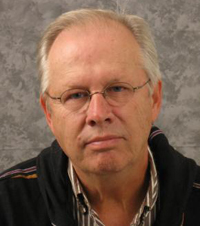 |
| Former Texas prosecutor Sam Millsap drew upon personal experience Saturday night while raising judicial and financial objections to capital punishment at a meeting of the Kansas Coalition Against the Death Penalty in Topeka. (Tim Carpenter) |
|
Former Texas prosecutor Sam Millsap drew upon personal experience Saturday night while raising judicial and financial objections to capital punishment at a meeting of the Kansas Coalition Against the Death Penalty in Topeka.
The life, and more pointedly, the death of small-time hoodlum Ruben Montoya Cantu is etched into the consciousness of former Texas prosecutor Sam Millsap.
Millsap's legal prowess and persuasive skills as Bexar County district attorney sent the 26-year-old Cantu to die by lethal injection at midnight Aug. 24, 1993. Millsap had no physical evidence and no confession, but he parlayed one person's eyewitness testimony into a guilty verdict and death sentence for the 1984 slaying of Pedro Gomez, 25, inside a vacant San Antonio house.
Another notch in the belt for law and order, Texas style.
One problem.
Millsap is now convinced Cantu should have never been on death row.
"I made a mistake," Millsap said. "Ruben Cantu should not have been prosecuted for capital murder. You have to make sure you're getting it right. Testimony of a single eyewitness is not enough."
Millsap was in Topeka on Saturday for the annual meeting of the Kansas Coalition Against the Death Penalty. The organization is hopeful Millsap's insights into the issue can inspire Kansas policymakers to give consideration to abolishing capital punishment. Ten men have been sentenced to death in Kansas since 1994. The Senate Judiciary Committee is scheduled to conduct hearings in January on a bill to repeal the 15-year-old law.
Opponents of the current law advanced a bill to the Senate floor during the 2009 session, but the measure wilted amid challenges from Democratic Attorney General Steve Six and Senate Majority Leader Derek Schmidt, an Independence Republican seeking the 2010 nomination for attorney general.
Fifteen states have no capital punishment statute, with New Jersey abolishing the sanction in 2007 and New Mexico ending the practice in 2008. At least one legislative chamber has passed abolition measures in New Hampshire, Colorado, Montana and Connecticut. Texas, Virginia, Oklahoma and Missouri lead the nation in executions.
Millsap, who has practiced law for 35 years, said Kansas didn't rush to reinstate the death penalty in the 1970s when other states took the plunge. There have been no executions in Kansas since 1965. The state's reticence to pull the trigger on an absolute punishment suggests the public might be persuaded to remove the death penalty from the scales of justice, he said.
"Texas has executed 442 people in the same period Kansas has executed nobody," he said.
Millsap doesn't count himself among those who abhor the death penalty on moral grounds. Instead, his objection centers on the frailties of the judicial system and the extravagant cost of warehousing a special class of inmate throughout years of appeals.
He said in states such as Kansas that don't execute people the status quo for those facing capital punishment takes the form of life without parole.
The wheels fell off the Cantu case in 2005 when Texas newspaper reports raised questions about the testimony of Juan Moreno, who had been shot repeatedly with Gomez while they were being robbed on Nov. 8, 1994. Moreno was Millsap's star witness in the Cantu trial. In addition, Cantu's co-defendant, David Garza, came forward to say he was present for the robbery and shooting of Moreno and Gomez, but his accomplice wasn't Cantu.
Millsap, who served as district attorney from 1982 to 1987, said he wasn't convinced of Cantu's innocence in the shootings, but has no doubt the evidence was too thin to proceed with a capital murder charge. He said DNA evidence, a weapon, confession or video evidence should be part of the mix in these cases.
The bright light cast on capital punishment cases should be used to illuminate general shortcomings of the judicial process, he said. There are far too many people exonerated while serving prison sentences for rape and other felony crimes based on eyewitness testimony later proven to be flawed, he said.
Millsap said the scary part of the Cantu story was that the man -- Cantu was 17 years old at the time of the double shooting -- received a "perfect trial." He said the case brought together an experienced judge, vigorous defense counsel, ethical prosecutor and fair jury.
"But," Millsap said, "20 years later my star witness says, 'I lied.' "
While Texans remain openly hostile to the idea of abandoning capital punishment, Millsap said the tragic aftermath of the Cantu case should cause level-headed people to evaluate the death penalty with fresh eyes.
"You assume the typical Kansan is a reasonable person and that the typical person is willing to take another look at this issue," Millsap said.
The Topeka Capital Journal

